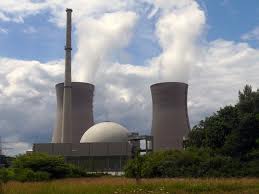The nuclear disaster in Japan spirals out of control and has created a new political reality in Germany. After ramming though an extension of the useful life of Germany's aging nuclear power plants, the chancellor has abruptly changed course – at least temoporarily:
After taking office, Dr Merkel’s administration set aside a proposal to make Germany nuclear-free by 2020, extending the life of ageing nuclear plants into the mid-2030s.
Dr Merkel reacted yesterday to the growing pressure with a temporary moratorium, during which she has called for a discussion about safety standards and Germany’s continued lack of a storage facility for nuclear waste.
“We are launching a safety review of all nuclear reactors . . . and all reactors in operation since the end of 1980 are to be idled a three-month moratorium,” said Dr Merkel.
“This moratorium will run until June 15th, after which we will know how to proceed.”
What is the magic of June 15? Will the regulatory bodies and scientific community give these old nukes a clean bill of health (Persilschein) in 90 days? The decision appears to be politically motivated, as the CDU/FDP coaltion faces an uphill batlle in the upcoming state elections. The majority of Germans polled are uneasy about nuclear power, and the Green Party is the beneficiary.
The cynicism of the decision was not lost on many:
Edmund Lengfelder, der Leiter des Otto-Hug-Stahleninstituts in München, brachte dies heute in einem Gespräch mit dem
Deutschlandfunk auf den Punkt: "Bis vor drei Tagen waren alle deutschen Atomkraftwerke sicher. Und dann passiert in Japan etwas. Und auf einen Schlag wird überlegt, ob man die sieben unsichersten Kraftwerke stilllegt. Das ist doch eine Lachnummer oder ein Beweis für die Unzuverlässigkeit und die mangelnde Vertrauenswürdigkeit in die Politik."
(Edmund Lengelder, director of the Otto-Hug Steel Institute in Munich was blunt in his assessment in an inverview on German Public Radio: "Up to three days ago all nuclear power plants in Germany were safe. And then something happened in Japan and suddenly we think about shutting down the 7 most risky power plants. That's just a bad joke, or else proof of the unreliability and lack of trust in politics. ")
We can certainly question the motivations of Angela Merkel for her actions, but at least she is doing something:
As tempting as it is to poke fun at the German Left, the U.S. suffers from a different strain of the same denial: The Germans, at least, have a plan, even though it’s unrealistic. We’ve ignored the problem altogether



0 comment
Könnte es möglicherweise sein, daß Frau Merkel, eine studierte Physikerin, insgeheim gegen Atomkraftwerke ist, ihr Amt und ihre Partei aber bislang das Gegenteil forderten?
Eins ist sicher: Der Betrieb von Atomkraftwerken ist unverantwortlich und zwar aus dem Grunde, weil es im Falle einer Katastrophe völlig wertlos ist, ob und wer sich dafür verantwortlich hält oder welche persönlichen Konsequenzen diese Person zu erwarten hätte.
Lovely. Again a political class panicking before elections.
This goddamn federalism is the grave of our future. With important elections around every few months, it is impossible to decide anything on long term.
Imagine what US politics would look like if a new president was to be voted every 6 months…
Zyme, we have Congressional elections every 2 years, which is equally disruptive.
Democracy is hard!
“Democracy is hard!”
And that is the thing David: People with a strong interest in political development would move through the ranks to decision making positions in any system, as long as they are flexible.
It is just the uninformed masses that would then have the opportunity of focusing on things they really know about – namely their own private lives.
WWGD
(“What Would Gutti Do?”)
Gutti would explain why NATO should not engage in Libya, therefore being critisized by the left opposition in the Bundestag. Madness.